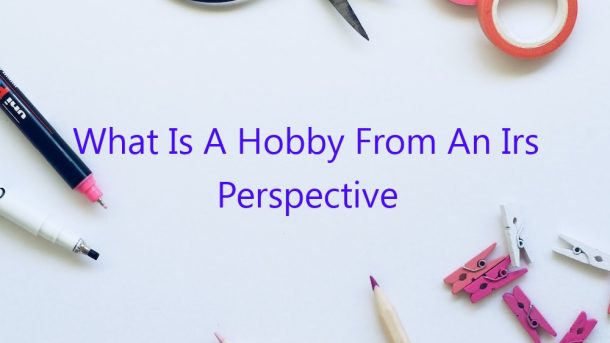What Is A Hobby From An Irs Perspective
From the IRS perspective, a hobby is not a business. You cannot deduct expenses related to a hobby on your tax return.
If you are engaged in a hobby activity for recreation or pleasure, you cannot treat the activity as a business. You cannot deduct any expenses related to the hobby activity on your tax return.
However, if you are engaged in a hobby activity to make a profit, you may be able to treat the activity as a business and deduct your expenses. To be able to do this, you must meet certain tests, including showing that you are engaged in the activity with the intent to make a profit.
If you are engaged in a hobby activity, you should keep track of the amount of time you spend on the activity, the expenses you incur, and the income you earn from the activity. This information can help you determine whether you are engaged in the activity for profit.
Contents [hide]
What does the IRS identify as the difference between a business and a hobby?
The Internal Revenue Service (IRS) differentiates between a business and a hobby in a few key ways. Generally, a business is engaged in to make a profit, while a hobby is pursued mainly for recreation or personal satisfaction. There are other factors the IRS considers when making this determination, which we will explore in more detail below.
One of the main factors the IRS looks at is how much time and effort you put into your activity. If you are making a serious effort to turn a profit, it is more likely that the IRS will consider your activity to be a business. Conversely, if you are only engaging in the activity casually or for fun, the IRS is more likely to deem it a hobby.
Another key consideration is how much money you make from your activity. If your income from the activity is significantly less than the amount of money you have invested in it, the IRS is more likely to call it a hobby. Conversely, if you are making a profit, the IRS is more likely to deem the activity a business.
The IRS will also look at whether you are engaging in the activity in a business-like manner. This includes things like keeping good records, advertising your services, and having a business plan.
If your activity meets most of the criteria above, the IRS will likely classify it as a business. However, there is no black-and-white answer, and the IRS will make a determination on a case-by-case basis. If you are not sure whether your activity is considered a business or a hobby, it is best to speak with an accountant or tax specialist.
Do you have to report hobby income to IRS?
Do you have to report hobby income to IRS?
There is no simple answer to this question, as it depends on a number of factors. Generally speaking, if you are earning income from a hobby, you are required to report that income to the IRS. However, there are a few exceptions to this rule.
One exception is if your hobby is considered a business. If you are operating your hobby as a business, you are required to report all of your income and expenses. This includes income from both your hobby activities and any other business activities you may have.
Another exception is if your hobby is not profitable. If you are not making a profit from your hobby, you are not required to report the income to the IRS. However, you must still report any expenses associated with the hobby.
If you are not sure whether or not you need to report your hobby income, it is best to speak with a tax professional. They can help you determine if you are required to report the income and, if so, which expenses you can claim as deductions.
What happens when IRS declares your business as a hobby?
If you own a business, it’s important to be aware of the potential consequences of being declared a hobby by the IRS. Here’s what you need to know:
What is the IRS definition of a hobby?
The IRS defines a hobby as “an activity engaged in primarily for pleasure, recreation, or sport.” In other words, a hobby is something you do for fun, not for profit.
What are the consequences of being declared a hobby by the IRS?
If the IRS declares your business to be a hobby, you can expect to face a number of consequences, including:
– You will be taxed on any income your business generates, even if it’s not enough to cover your expenses.
– You may not be able to deduct any business expenses from your taxable income.
– You may be subject to a self-employment tax on your income.
– You may be required to pay estimated taxes on your business income.
How can I avoid being declared a hobby by the IRS?
There are a few things you can do to avoid being declared a hobby by the IRS, including:
– Making a profit: If your business is profitable for three out of five years, the IRS is less likely to declare it a hobby.
– Keeping good records: Keeping accurate and detailed records of your business expenses and income can help demonstrate that your business is legitimate and not just a hobby.
– Demonstrating a business purpose: The IRS will be more likely to consider your business a legitimate endeavor if you can demonstrate a legitimate business purpose for it.
If you’re concerned that the IRS may declare your business to be a hobby, it’s important to consult with an experienced tax professional who can help you take steps to avoid this.
How much money can you make as a hobby before paying taxes?
How much money can you make as a hobby before paying taxes?
The answer to this question largely depends on how you earn the money. If you are selling products or services that you created yourself, the IRS generally considers this to be a hobby and not a business. As a result, you are not required to pay taxes on the income generated from your hobby.
However, if you are earning money from activities that are not considered hobbies (such as selling products or services that you did not create yourself), you will likely need to pay taxes on that income. In most cases, you will need to report the income earned from your hobby on your tax return and pay taxes on it accordingly.
It is important to keep in mind that the IRS may classify your hobby as a business if you are earning a profit from it. If this occurs, you will be required to pay taxes on the income generated from your business.
At what point does a hobby become a business?
When does a pastime become a profession? This is a question that doesn’t have a definitive answer. There is no specific point at which a hobby becomes a business. It depends on the individual and their specific circumstances.
Some people may consider their hobby to be a business when they start selling products or services that they created as a result of their hobby. Others may consider their hobby to be a business when they start to earn a significant amount of money from it.
There is no right or wrong answer. It depends on the person’s definition of a business and their specific situation. There is no single rule that applies to everyone.
However, there are a few things to consider when deciding whether or not your hobby has turned into a business.
First, you need to ask yourself why you are doing the hobby. Are you doing it for fun, or are you doing it to make money? If you are doing it for money, then it is probably a business.
Second, you need to ask yourself how much money you are making from the hobby. If you are making a significant amount of money, then it is probably a business.
Third, you need to ask yourself how much time you are spending on the hobby. If you are spending a lot of time on it, then it is probably a business.
Fourth, you need to ask yourself whether you are doing the hobby to make money or to have fun. If you are doing it for money, then it is probably a business.
Finally, you need to ask yourself whether you are treating the hobby like a business. Are you doing things like advertising your services or products, or tracking your income and expenses? If you are, then it is probably a business.
If you answer yes to most of these questions, then it is probably a good indication that your hobby has turned into a business.
What is the hobby rule?
The hobby rule is a principle that governs the tax treatment of hobby income and expenses. The rule states that expenses incurred in connection with a hobby are only deductible to the extent of the income generated by the hobby.
The purpose of the hobby rule is to prevent taxpayers from deducting expenses for activities that produce negligible income. The rule applies to any activity that is not engaged in for profit. Whether an activity is engaged in for profit is determined by looking at all the facts and circumstances.
Some factors that may be considered include whether the activity is conducted in a businesslike manner, the time and effort put into the activity, the amount of profit or loss generated by the activity, and whether the activity is hobby-related or business-related.
If an activity is determined to be a hobby, the taxpayer can only deduct expenses up to the amount of hobby income. Any excess expenses cannot be deducted and are considered to be a personal expense.
The hobby rule is a complex area of tax law, and there are many exceptions and nuances. It is important to discuss any hobby activities with a qualified tax professional to determine how the hobby rule applies.
How do I report a hobby to the IRS?
When it comes to reporting your hobby income to the IRS, there are a few things you need to know. The good news is that most hobby income is considered taxable, but there are a few exceptions. In this article, we will break down everything you need to know about reporting your hobby income to the IRS.
What is Considered Hobby Income?
In general, any income you earn from your hobby is considered taxable. This includes income from selling goods or services, royalties, and any other payments you receive for your hobby. However, there are a few exceptions. For example, if you hobby is donating eggs or sperm, then any payments you receive for this are not considered taxable income.
How Do I Report My Hobby Income?
If your hobby results in taxable income, then you will need to report this on your tax return. You will need to report the amount of income you earned, as well as any expenses related to your hobby. This includes costs such as supplies, equipment, and travel expenses.
Can I Deduct my Hobby Expenses?
In most cases, you can deduct expenses related to your hobby. This includes costs such as supplies, equipment, and travel expenses. However, there are a few limitations. For example, you can only deduct expenses that exceed the income you earned from your hobby. In addition, you cannot deduct expenses that are considered personal, such as food and clothing.
Are there any Other Requirements?
In order to deduct your hobby expenses, you will need to itemize your deductions on your tax return. This means you will need to complete Schedule A and list your hobby expenses along with all of your other deductions.
If you have any questions about reporting your hobby income to the IRS, be sure to consult a tax professional.




